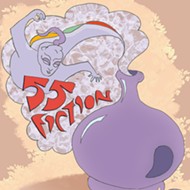Rules for the 55 Fiction short story contest
[
{
"name": "Promo Temp Targeted",
"id": "PromoTempTargeted",
"class": "inlineCenter",
"insertPoint": "4",
"component": "15511697",
"requiredCountToDisplay": "0"
},
{
"name": "Ad - Medium Rectangle CC01 - 300x250 - Inline Content",
"class": "inlineCenter",
"insertPoint": "8",
"component": "15582119",
"requiredCountToDisplay": "12"
},{
"name": "Ad - Medium Rectangle LC01 - 300x250 - Inline Content",
"class": "inlineCenter",
"insertPoint": "18",
"component": "15582122",
"requiredCountToDisplay": "22"
},{
"name": "Ad - Medium Rectangle 9 - 300x250 - Inline Content",
"class": "inlineCenter",
"insertPoint": "28",
"component": "15582121",
"requiredCountToDisplay": "32"
}]
Our annual short story contest we call 55 Fiction is upon us, a time to show off your literary skills by writing us a short story using only 55 words. Here are the rules:
The story must contain four elements:
1) a setting all stories have to take place somewhere, so be sure your story has a setting.
2) a character or characters you also need some characters. Again, this sounds obvious, but it’s sometimes lacking, especially when writers mistake a poem for a story. Characters don’t have to be people, of course. They can have infinite variations;animals, rocks, microbes, ghosts. Anything.
3) conflict to be effective, a story also needs conflict. The word itself can be misleading; conflict doesn’t mean that your story needs a war or people fighting in the streets. It simply means that something has to happen in your story. The lovers argue. The deer flees. The alien is perplexed by the creatures below him on that strange, blue planet. Even in this last example, something is happening, even though our alien isn’t moving or talking. There is conflict; a tension is present in the narrative.
4) resolution this leads us to the outcome of the story, also known as resolution. This doesn’t necessarily mean that the story has to have a moral (“Justice is its own reward,â€? “In the end, love triumphsâ€?), or even that the conflict itself is resolved. It may or may not be.
But what it does mean is that when the story ends, someone has to have learned something: He found out his wife wanted to kill him and grind him up in the garbage disposal; the star troopers successfully eluded the alien armada when they thought they‘d been discovered; Jim was show to be as much of a liar as his father; whatever.
The characters in your story don‘t necessarily have to have learned anything. But if they don‘t, then the reader must. The story‘s resolution is what creates its impact and meaning, giving readers a sense of completion and satisfaction.
Again, we can‘t stress enough the importance of making certain you‘re writing a story, not just a situation taking place that has nothing happening. So examine your work honestly. A lot of well-written entries have often contained intriguing characters in situations going nowhere, thus leaving the story‘s outcome uncertain or non-existent.
A few other things to keep in mind when you write your story:
You can write about anything you like, but you can’t use more than 55 words. A word is anything that’s in the dictionary no matter how long or short. And, yes, that includes teensy words like “a“ and “of”
Contractions count as single words, so if you’re really seeking word economy, keep this in mind. If you write, “He will jump” it’s three words. But if you write, “He’ll jump” it’s only two. Very economical. Also, any contraction that’s a shortened form of a word is counted as a full word. Like using ’em for “them”
Hyphenated words don’t count as single words. A compound adjective like “dyed-in-the-wool commie” is five words, not one. So is “long-time friend” etc. are good examples. But there is an exception: Any word that doesn‘t become two distinct, freestanding words when the hyphen is removed. For example, “re” doesn‘t become a word when the hyphen is removed from “re-written” but “written“ is.
And, no, the title of your story isn’t included in the word count; but it can‘t be over six words long.
An initial also counts as a word (L.L. Bean, e.e. cummings, etc.) since it‘s basically an abbreviation of a full word. The only exception is when it‘s part of an acronym, like laser, or an abbreviation like FBI.
Also remember that numbers count as words, too, expressed as either numerals (8, 28, 500, or 1984), or as words (eight, twenty-eight, etc.). Our hyphenated word rule applies here, too. Twenty-eight is two words, but when it‘s only one word when expressed as 28. Don‘t cheat yourself out of an extra word that you may need.
Any punctuation is allowed, and none count as words, so don’t worry about being miserly with them if they work to some effect.
And no jokes. In the past, we‘ve tried to weed out stories that are actually just old jokes re-written in a 55-word format.
You can submit as many stories as you want, but each story must be submitted typed on its own individual sheet of paper. Make sure your name, address, and telephone number are included on each story submission so we can contact you should you be one of our winners.
The deadline for all entries is 5 p.m. on Monday, June 19. We’ll publish the winners in our June 29 issue, so put a stamp on that envelope and mail your story to New Times 55 Fiction, 505 Higuera St., San Luis Obispo, CA 93401.
And remember: Just 55 words. ∆
Example:
“Careful, honey, it’s loaded,” he said, re-entering the bedroom.
Her back rested against the headboard. “This for your wife??”
“No. Too chancy. I‘m hiring a professional.”
“How about me?”
He smirked. “Cute. But who‘d be dumb enough to hire a lady hit man?”
She wet her lips, sighting along the barrel.
“Your wife.”
Three compilations of 55 Fiction have been published. Check with The Novel Experience bookstore in San Luis Obispo 544-0150 to see about ordering. Direct any questions about the 55 Fiction contest to King Harris, Managing Editor, at [email protected]





